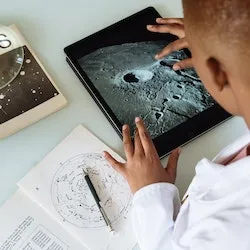
Level 1:
Frolicking is a fun activity. It means playing and moving around cheerfully. You can frolic with friends or pets. Frolicking involves jumping, dancing, and running around. It’s a good way to relax and enjoy yourself. Sometimes people say “no frolicking,” which means it’s not the right time to be too happy. There are other words that mean frolicking, like romping and prancing. These words make it easy to talk about your playful plans. So, if you want to feel free and have some fun, try frolicking!
Level 2:
Frolicking is a joyful activity that involves lively movements. It means playing and moving around cheerfully with friends or pets. Frolicking includes jumping, dancing, and running around, and it can be a great way to unwind and enjoy yourself. Sometimes people say “no frolicking,” meaning it’s not the right time to be too happy. There are other words that mean frolicking, like romping and prancing, which make it easy to talk about your playful plans. Try frolicking when you want to feel free and have some fun—it’s a wonderful way to relax and let off some steam!
Full Story:
Are you tired of the mundane everyday routine? Do you ever feel like running wild in a field without a care in the world? If so, you may be craving some frolicking!
Frolicking is a fun and playful behavior that involves energetic and lively movements. It’s often associated with joy, excitement, and freedom. So, what does frolicking mean, and why is it such a popular pastime?
Frolicking is defined as “to play and move about cheerfully, excitedly or energetically,” according to the Oxford English Dictionary. The behavior typically involves jumping, skipping, dancing, or running around in a carefree manner. Frolicking can be done alone, with friends, or even with pets. It’s a great way to let off steam, release stress, and enjoy the moment.
So, what are some examples of frolicking? Imagine running through a meadow of flowers, splashing in a puddle on a rainy day, or jumping on a trampoline. These activities are all forms of frolicking and allow us to engage our playful side.
But what about when someone says “no frolicking allowed?” Does that mean the end of fun and games? Not necessarily. When someone says “no frolicking,” they’re often referring to a situation where it’s not appropriate to be overly jovial or energetic. This could be in a formal setting, during a serious conversation, or when others are trying to concentrate. It’s important to be mindful of others’ feelings and adjust our behavior accordingly.
Now, let’s talk about some synonyms for frolicking. Some common ones include romping, gamboling, prancing, cavorting, and capering. Each of these words captures the playful and lively nature of frolicking. So, the next time you’re feeling spontaneous and want to try something new, consider using one of these words to describe your intentions.
In addition to being a fun pastime, frolicking can have some health benefits as well. It’s a great way to get some exercise, improve mood, and boost creativity. By engaging in playful activities, we allow our minds and bodies to relax and recharge. This can ultimately lead to greater productivity and a more positive outlook on life.
So, what are some ziggies slang? Ziggies is actually not a common term, but it could be a reference to Ziggy Stardust, the alter ego of David Bowie. Ziggy Stardust was known for his flamboyant style and energetic performances, which could be considered a form of frolicking.
Lastly, let’s discuss a fancy word for embarrass. The word “mortify” is often used to describe feelings of extreme embarrassment or humiliation. Mortification can occur when we experience a public failure, make a mistake, or behave in a socially unacceptable way. While it’s not always pleasant, mortification can help us learn from our mistakes and become better people in the long run. Frolicking is a fun and playful behavior that can bring joy and excitement to our lives. Whether we’re running through a field, dancing with friends, or simply laughing out loud, frolicking allows us to let loose and enjoy the moment. So, the next time you feel like letting your hair down, embrace your inner child and frolic away!
Questions:
What is the definition of frolicking?
Why is frolicking considered a fun activity?
Do you think it’s important to be mindful of others’ feelings when frolicking? Why or why not? ()
What are some synonyms for frolicking?
Can frolicking have any health benefits?
Fill in the Blanks:
prancing, frolicking, appropriate, spontaneous, jovial, gamboling, puddle, mortification, lively, flamboyant, romping, carefree, productivity, Frolicking, cavorting, humiliation, capering, energetic, Mortification
If so, you may be craving some ________!
________ is a fun and playful behavior that involves ________ and ________ movements.
The behavior typically involves jumping, skipping, dancing, or running around in a ________ manner.
Imagine running through a meadow of flowers, splashing in a ________ on a rainy day, or jumping on a trampoline.
When someone says “no frolicking,” they’re often referring to a situation where it’s not ________ to be overly ________ or energetic.
Some common ones include ________, ________, ________, ________, and ________.
So, the next time you’re feeling ________ and want to try something new, consider using one of these words to describe your intentions.
This can ultimately lead to greater ________ and a more positive outlook on life.
Ziggy Stardust was known for his ________ style and energetic performances, which could be considered a form of frolicking.
The word “mortify” is often used to describe feelings of extreme embarrassment or ________.
________ can occur when we experience a public failure, make a mistake, or behave in a socially unacceptable way.
While it’s not always pleasant, ________ can help us learn from our mistakes and become better people in the long run.
Vocabulary:
Frolicking: Playing and moving about cheerfully, excitedly or energetically.
Energetic: Showing or involving great activity or vitality.
Lively: Full of life and energy; active and outgoing.
Carefree: Without anxiety or worry.
Puddle: A small pool of liquid, especially rainwater on the ground.
Appropriate: Suitable or proper in the circumstances.
Jovial: Cheerful and friendly.
Spontaneous: Performed or occurring as a result of a sudden inner impulse or inclination and without premeditation or external stimulus.
Romping: Play roughly and energetically.
Gamboling: Run or jump about playfully.
Prancing: Move with high springy steps.
Cavorting: Jump or dance around excitedly.
Capering: Skip or dance about in a lively or playful way.
Flamboyant: Tending to attract attention because of their exuberance, confidence, and stylishness.
Alter ego: A person’s secondary or alternative personality.
Humiliation: The action of humiliating someone or the state of being humiliated.
Mortification: Great embarrassment and shame.
Productivity: The effectiveness of productive effort, especially in industry, as measured in terms of the rate of output per unit of input.




